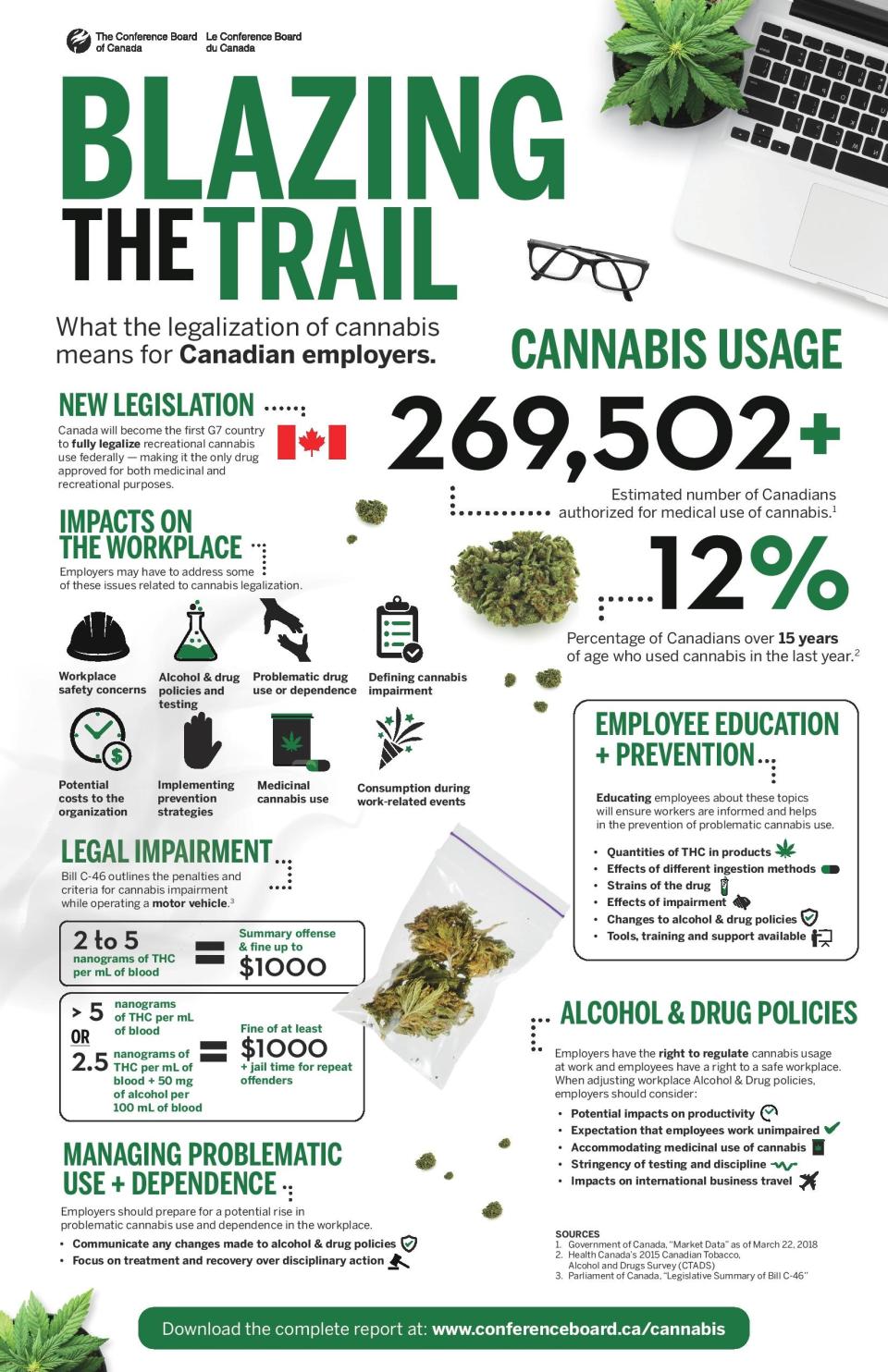Employers push for workplace drug tests ahead of pot legalization

The anticipated Oct. 17 legalization of recreational cannabis in Canada is expected to bring about a major culture shift for those using, and interested in using, marijuana.
A coalition of employers from across the country are now demanding federal legislation for alcohol and drug testing for workers in safety-sensitive positions. The primary goal of this legislation is to tackle the anticipated workplace safety risk.
Most employers and associations in the coalition are in industries where safety is a critical component of what they do.
“Our members employ air traffic controllers, pilots, train conductors and crane operators, to name just a few,” says Derrick Hynes, President and CEO of Federally Regulated Employers – Transportation and Communications (FETCO). “That no clear rules exist in this space, when the evidence demonstrates cannabis usage is going to increase, is a serious workplace and public safety concern.”
The proposed framework would establish a clear and common set of rules throughout Canada, aimed at preventing drug impairment at the workplace that could risk the lives of millions of Canadians as well as other employees.
“We think a more reasonable way to approach this from a safety perspective is for the government to intervene and pass a piece of legislation with some associated regulation that lays out the rules for what is required so that we conduct testing in the workplace to enhance safety,” says Hynes.
The U.S. transportation sector already has a comprehensive approach that is legislated and enforced by the government.
“Testing is required for employers in safety sensitive transportation type work that has to be implemented. We do not have that in Canada,” says Hynes. “The problem that we have in Canada is that there is no common set of rules so employers are left to their own devices to figure out what is and what is not permitted and what we end up falling back on are a series of arbitrations and court cases which also do no clearly lay out what the rules are”.
“Do they think people are going to show up high?”
Not everyone things random drug testing is the best approach, as it’s addressing the wrong issue.
“Do they think so little of the people they employ in the sense that just because cannabis is legal they are going to show up to work high?” asks Troy Winters, a health and safety representative from the Canadian Union of Public Employees (CUPE).
“The broader conversation should be about impairment and not drug use. There are a lot of causes for impairment that are not restricted to drug use. Impairment could be fatigue or severe distress from home life. ”
A 2017 report released by Health Canada reveals that 20 per cent of survey respondents admitted that they had consumed cannabis in the past year. Of those, a further 20 per cent said that they had consumed cannabis shortly before going to work or during their shift.
Monica Haberl, an HR researcher with The Conference Board of Canada, says there is a history of alcohol and drug use at the workplace in Canada. In 2017, the Toronto Transit Commission (TTC) revealed that more than half of the first 22 employees who failed random drug testing in the first six months of the program tested positive for marijuana. Train operators who are employed with the TTC control heavy vehicles, working around millions of Canadians everyday. Harbel says the legalization of cannabis only adds to the existing problem.
“There is research that demonstrates that random testing deters employees from using drugs such as cannabis” says Haberl.
In Alberta, energy company Suncor is going through ongoing litigation challenges with their labor partners to implement random testing as a result of drug use in in some of their worksites.
A new report released by The Conference Board of Canada says that more than half of Canadian organizations are either concerned or very concerned about the implications this will have on the workplace.
“Gauging and managing impairment; adapting workplace policies; and ensuring employees are educated on what is allowed and what remains prohibited are all crucial components to a smooth transition to legalization,” says Bryan Benjamin, Vice-President, Organizational Performance at The Conference Board of Canada.

Labour relations, health & safety and health & wellness associations all echo the same tone of concern from an HR standpoint on the challenges of managing relationships between managers and employees in terms of impairment and intoxication at work.
Ethical implications
Hynes acknowledges the need for privacy, but says the need for testing is paramount.
“While we believe that privacy is a part of the discussion, we’re simply looking for a reasonable solution here that strikes balance between safety and privacy,” says Hynes. “We believe that the testing tools and technology has evolved over the past couple of years. Testing tools that are available are now effective and they do not because of the way that they are administered represent a violation of an individuals privacy or dignity.”
CUPE’s stance is that the approach oversteps what is necessary.
“We don’t agree with mass random testing as a principle,” says Winters. “Random resting doesn’t tell you if someone is impaired. A positive test for marijuana or alcohol, simply tells them that its in the system but not to the extent of impairment. You are violating someones privacy but not determining if they are impaired at work. There is no trade off. From a health and safety standpoint random drug testing is a very immature and poorly developed system.
“Adding random testing is not going to fix any problems with impairment. If they were to adopt a more mature occupational health and safety system through supervisors, no laws would need changing and we would also be able to tackle other forms of impairment.”
Download the Yahoo Finance app, available for Apple and Android.

